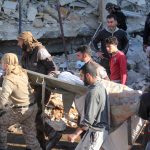This post originally appeared in The Huffington Post.
It’s been just three weeks since the UN Security Council adopted its latest resolution on the conflict in Syria, re-authorizing cross-border delivery routes for humanitarian aid and promising – once again – to take “further measures” if the parties to the conflict do not comply with international humanitarian law.
In these three weeks, the Assad government has systematically ignored this warning. Instead, its forces have continued their relentless violation of international rules of war, among them the requirement to spare civilians, health personnel, and medical facilities.
On December 25, a suspected chemical weapons attack in Moadamiya drove civilians to the local hospital with symptoms consistent with exposure to toxic agents, including difficulty in breathing, bloody frothing at the mouth, muscular contractions, and involuntary urination and defecation. Several patients have died as a result. Local documenters say the missile attack came from the Syrian government-controlled Al Mezzeh airbase.
It’s very likely that this suffering was caused by illegal chemical weapons, but it has not been possible to confirm which toxic agent was responsible, and how it was distributed. There’s a reason for that.
Chemical weapons attacks are notoriously difficult to substantiate. The debris they leave is hard to detect from satellite images. To positively identify a toxic agent, you need to analyze affected blood samples. But in Syria, and in particular in the Damascus suburb where the December attack occurred, the specialized medical equipment needed to conduct these tests is in severely short supply.
What’s more, it is exceedingly difficult to safely deliver blood samples from Moadamiya to health care facilities with the necessary infrastructure. Supplies to adequately preserve samples are virtually non-existent. With health care centers and personnel openly targeted – at least 240 medical facilities have been attacked and 697 medical workers killed in the conflict, primarily by Assad government forces – transporting blood samples has become very dangerous. The combination makes identifying toxic agents near impossible.
Further, government forces have recently turned their sights on border area hospitals in northern Syria that to some extent have served as referential hospitals. Physicians for Human Rights has received multiple reports that health facilities in ‘Azaz and Hraytan, in the suburbs of Aleppo, were hit on December 25 and 26, further debilitating Syria’s already fragile health infrastructure.
How many war crimes does the Assad government need to commit for the UN Security Council to take more decisive action?
Some might say the December 2015 resolution did effect change. Last week, the Assad government agreed to allow humanitarian aid into Madaya, a rural area close to the Lebanese border where a six-month siege has caused countless deaths and unspeakable suffering. This aid is supposed to arrive today. Survivors, driven to starvation by their own government, report being reduced to eating leaves, insects, even their pets – and having to depend on a veterinarian and a carpenter for health care and surgery.
However, the very fact that the Assad government is in a position to allow or deny humanitarian aid is because it is using besiegement as a weapon of war – in direct contravention of UN Security Council directives and the Geneva Conventions. In fact, the limited ceasefire agreement between Syrian government and opposition forces last year should, in principle, have brought humanitarian aid to Madaya months ago. Moreover, under international humanitarian law, organizations providing aid must have unfettered access to Madaya and the dozens of other besieged areas throughout Syria, with or without Assad’s express permission.
It has been nearly five years, 300,000 deaths, and four million refugees since the Security Council first called on the Syrian authorities to respect their obligations under international law. The three weeks since the latest Security Council resolution show the Assad government has no intention of doing so.
Whatever solution Syrian peace talks may arrive at, world leaders must immediately focus on protecting civilians and improving conditions on the ground. Without concrete action to reduce the suffering of Syrian civilians, another UN Security Council resolution on this conflict will appear as empty as so many other New Year’s resolutions.

